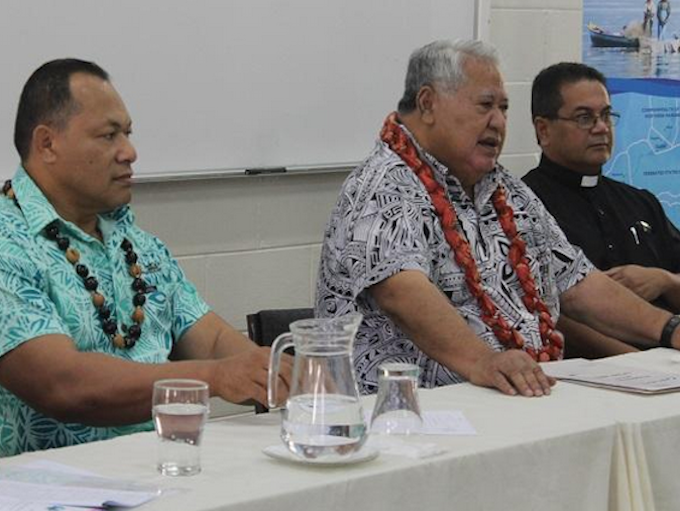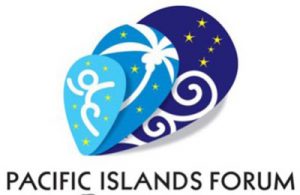
Pacific Media Watch Newsdesk
Leaders from across the Pacific are meeting in Apia, Samoa, this week to discuss the future of the region’s oceans.
Under the theme “The Blue Pacific: Our sea of islands provide for our secure future through sustainable development, management and conservation”, members of the Pacific Islands Forum (PIF) have gathered in Samoa for the 48th leaders meeting opening today.
 Proceedings began with the Smaller Islands States leaders meeting, in which proceedings went “very, very well”, said Baron Waqa, President of Nauru.
Proceedings began with the Smaller Islands States leaders meeting, in which proceedings went “very, very well”, said Baron Waqa, President of Nauru.
“There were a number of matters that were discussed and a lot of very healthy interventions from leaders,” he said.
“Climate change was still very, very actively discussed in the meeting,” Waqa said.
Ahead of the meeting, incoming PIF chair and Samoan Prime Minister Tuilaepa Sa’ilele Malielegaoi said the “Blue Pacific” concept – shared stewardship of the Pacific Ocean based on a shared geography, ocean identity and resources – provided the Forum with a unique opportunity to strengthen collective action and subsequently its vision for the region.
“Blue Pacific provides a new narrative for Pacific regionalism and how the Forum engages with the world.
Long-term commitment
“This new narrative calls for inspired leadership by the Forum and a long-term commitment to the benefits of acting together, as one blue continent, has the potential to define a Blue Pacific economy, ensures a sustainable, secure, resilient and peaceful Blue Pacific as well as strengthens Blue Pacific diplomacy to protect the value of our ocean and our peoples,” he said.
Tuilaepa said the concept of the Blue Pacific was integral for the Forum moving forward, as the ocean was crucial for the Pacific and its people.
“Exercising a sense of common identity and purpose linked to the ocean has been critical for protecting and promoting the potential of our shared Pacific Ocean.
“It is this commonality of the fundamental essence of the region which has the potential to empower the region through collective, combined agendas and actions.
“The Blue Pacific will strengthen the existing policy frameworks that harness the ocean as a driver of a transformative social, cultural, political and economic development of the Pacific.”
Tuilaepa warned, however, that implementing the Blue Pacific required “whole Forum commitment”.
“Above all else it will require a different way of working together that prioritises the Blue Pacific as the core driver of Forum policy making and collective action. The Forum political dialogue needs to be informed by the Blue Pacific which in turn supports Forum actions in a manner that empowers the region,” he said.
Climate champions remembered
Forum leaders also held a moments silence for climate change champion Tony de Brum and government minister Mattlan Zackhras of the Marshall Islands, who died on August 24 and August 8 respectively.
Absent from this year’s meeting is Palau’s president Tommy Remengesau.
Pita Ligaiula of PACNEWS reports security issues caused by North Korea’s recent missile tests have forced Remengesau to travel to Japan to speak with US allies.
In his place is Vice-President Raynold Oilouch, who said the ocean was a “very critical component and surveillance of our jurisdictions” for Palau at this year’s meeting, Pacific Note reports.
“This is the time again to reflect on the unfinished business and what needs to be done and how best we can progress,” he said.
Radio Kiribati reports Fiji is again absent at the annual meeting, although it is “back at the table” on a ministerial level, said PIF Secretary-General Dame Meg Taylor.
The PIF meeting continues with an official opening and also the Pacific ACP leaders meeting.
The PIF was established in 1971 by New Zealand, Australia, the Cook Islands, Fiji, Nauru, Tonga and Western Samoa as a trade body. The Forum has evolved and now serves as the primary body for Pacific Island leaders to discuss the political, economic and developmental issues facing the region.
Forum members comprise Australia, Cook Islands, Federated States of Micronesia, Fiji, Kiribati, Nauru, New Zealand, Niue, Palau, Papua New Guinea, Republic of Marshall Islands, Samoa, Solomon Islands, Tonga, Tuvalu and Vanuatu French Polynesia and New Caledonia.












































